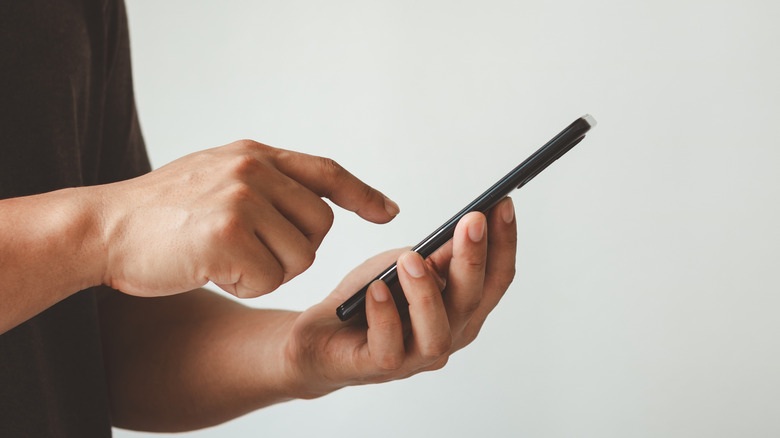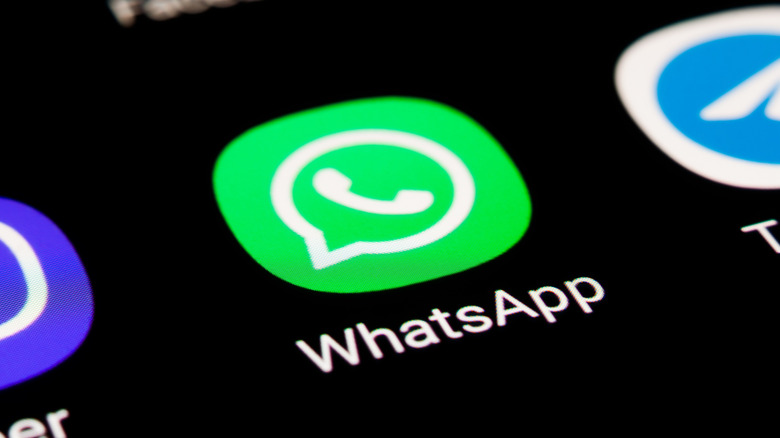
Short Message Service (SMS) has been a staple of text messaging since the flip phone, but it may be time to let it evolve. SMS was created in 1992, back when cellphones could be mistaken for bricks. Nowadays,
even the minimalist phones available in 2025 are smartphones pretending to be dumb phones. Technology moves fast, and in the tech world, a 30-year-old standard is as ancient as the Egyptian pyramids. Despite this, SMS is still bizarrely common in the United States, where trillions of SMS texts are sent every day compared to a fraction of that figure in other countries. This preference for SMS can be confusing to non-Americans, who have long since gone all-in on third-party messaging apps like WhatsApp. Even the U.S. government now tells you not to use normal calls and texts, and even intractable Apple ended the blue-bubble-green-bubble silliness by supporting Rich Communication Services (RCS) messaging on iPhone with Android users. If you're an Android user, it's time to let go of SMS for better alternatives — and for much better reasons than simply its age.
There are a bevy of reasons why SMS deserves to be put out to pasture with dignity, except as a legacy communication fallback for emergencies. Convenience-wise, it pales in comparison to just about every messaging option that came after it, and it's rife with security risks in our modern age, making it a favorite for hackers and scammers. Given the numerous excellent alternatives available, it's a wonder anyone uses it at all. Here are five reasons you should stop using SMS messaging.
Read more: 6 Smart Gadgets To Help Upgrade Your Garage Or Workshop
It's Terrible, Feature-Wise

The biggest reason to stop using SMS is that, frankly, it sucks compared to any other modern messaging option. It can only support up to 160 characters, so messages longer than that need to be chopped up into chunks. SMS also only supports text. You cannot send any sort of media, not even audio messages or simple GIFs. There's no encryption to speak of, no delivery or read receipts, no typing indicators, no message reactions, no threaded replies, no message editing or deleting, no online indicators, nothing. The only benefit SMS has over the competition is that it works data-free via your cellular network. These days, though, that's not a selling point when the cheapest unlimited data phone plan can be had for as little as $25.
If you primarily use SMS for communication, it's time to join the modern messaging party. Third-party messaging apps (WhatsApp, Telegram, Signal) are amazing. They support all of the things mentioned above that SMS does not, and then some. Many messaging apps can do audio and video calls, view-once photos, disappearing messages, message translation, voice message transcripts, and an ever-growing list of things you won't ever see on SMS.
We get it, you're used to your texting app and you refuse to download a third-party messenger. Even still, there are options. If you can't send pictures through text messages, then simply changing to the younger brother of SMS, Multimedia Messaging Service (MMS) in the settings will be better than nothing. MMS is not the ideal, but it supports a larger 1,600-character limit per message, as well as video, audio, and delivery receipts. Rich Communication Service protocol is still better. Switch from SMS to RCS on Android to get no character limit, typing indicators, read receipts, location, and message encryption.
There's No Encryption To Speak Of

Encryption is a huge deal. It scrambles the contents of your messages, making it indecipherable to outside observers. Encryption is the default for many things you don't even realize use encryption, like HTTPS, Bluetooth LE, and AirDrop. If you don't already, you should encrypt your Wi-Fi network, password-protect your USB drives, and make your important documents disaster-proof. Most modern messaging apps support encryption, and this feature also works with RCS. SMS, however, is completely, absolutely unencrypted.
As a result, sending SMS messages is a lot like passing a folded note across the classroom; Anyone along the way could open it and read the contents. "60 Minutes" demonstrated how easy it is to snoop on SMS in 2016. You only need someone's phone number to read the complete contents of their SMS messages. While this demonstration was more to do with hackers, the government is probably more likely to be eavesdropping on your text convos. The ACLU put it perfectly: "is the government reading our email, texts and IMs without a warrant? You bet." The land of the free, after all, is also the land of the Patriot Act.
Then there's the issue of cell carriers. They can hold on to your data for years. Even if no one inside those companies abuses their privileges to read your texts, there's still the risk of data thieves. Even the largest U.S. cell network carriers are no strangers to a breach. Verizon has had data leaks for years, and it doesn't seem to be stopping any time soon. Using encrypted messengers, especially those that support end-to-end encryption, protects users from hackers, overreaching governments, and companies that fail to guard your data — but SMS makes your messages low-hanging fruit for all of the above.
Hackers Can Intercept Your SMS Messages, Or Send You SMS Spam

We mentioned briefly how hackers can eavesdrop on your SMS messages, and SMS messages can be intercepted in a litany of ways. Hackers can perform a SIM jacking where they bypass you and your carrier to gain access to your SIM, and thus the messages and calls it receives. They can hijack your cell phone number with a cheap prepaid plan and a Letter of Authorization. They can use drones that pretend to be cell towers to intercept your data.
What's more concerning is what hackers do with the information they intercept. Many people receive 2FA authentication codes via SMS, rather than using something more secure like Google or Microsoft Authenticator. By intercepting your SMS messages, hackers can gain access to your most vital accounts, like emails and bank accounts. Obviously, the solution here is to stop receiving text verification messages altogether in favor of a 2FA app, but it just goes to show how vulnerable SMS is for anything sensitive.
Aside from 2FA codes that you receive over SMS, hackers can bypass your carrier and send SMS messages straight to your phone. Your phone can't distinguish a cell tower from a hacker. This is known as SMS Blaster Fraud, and it's more common than we'd like to believe. For instance, a criminal in London was able to send thousands of scam messages to people while driving around the city with an SMS blaster in the back of his car (via The Guardian). There has also been a rise in state-sponsored hackers compromising U.S. cell carriers — the reason the US government now recommends that you stop using SMS.
SMS Is A Cesspool Of Smishing Messages

Have you ever received a message informing you of a fine or the revocation of your driver's license, or something similarly urgent and scary-sounding? Then you've likely been victim of smishing texts, an increasingly common phenomenon. Smishing is a form of phishing that is conducted via text rather than email. Like phishing, smishing tricks you into clicking on a malicious link that either takes you to a fake version of a site you know (like your bank's website) or a URL that injects your device with malware.
Smishing, despite using outdated SMS messages that can only feature text, is shockingly effective. This is likely because, for years, people have been receiving text 2FA codes and alerts, so they automatically assume they're legitimate. Hackers have been going as far as making their own fake cell towers to send them out, preventing carriers from filtering them. Your phone can receive smished texts at any time it encounters an SMS blaster, and it's unlikely that this SMS vulnerability can ever be entirely defended against.
Although third-party messaging apps aren't completely immune to phishing-like attacks, they often do a much better job at filtering out spam. WhatsApp, for example, will stop high volumes of unknown messages and calls from unknown phone numbers. It's up to you to be smart about evaluating any messages you get at the end of the day. Pig butchering scams, a type of online investment fraud, which causes people to lose thousands of dollars, are firmly in the domain of third-party messengers like WhatsApp, not SMS, but at least WhatsApp lets you block people and report fraudulent accounts. SMS can't, and it's telling that SMS messages are either a risky, exploitable medium untrustworthy of sensitive information, or a thriving domain of spam — all while being less functional than other message options.
Use These Messengers Instead

Hopefully by now it's clear that SMS should be avoided like the plague. There are a plethora of alternatives that make the switch painless. Most Android phones ship with Google Messages, which supports end-to-end encryption with other Google Messages users, and RCS for the rest. You should make sure your text app of choice employs RCS, at the bare minimum. Third-party messengers that use end-to-end encryption are far more preferable since no one but you (and the person you're talking to) can see the contents of your messages. WhatsApp, Messenger, and Instagram all support end-to-end encryption and are therefore superior to SMS. You may no longer want to use WhatsApp due to privacy concerns, but at the very least, you can be assured that WhatsApp cannot read the contents of your chats.
Many are rightfully skeptical of Meta given its atrocious privacy track record, and there's news that WhatsApp ads are coming to a formerly ad-free messenger. Thankfully, there are many other excellent options at your disposal. Signal is the gold standard for encrypted messaging apps, even in the face of news of the Trump administration's Signal scandal. Countless other encrypted apps like Session and Briar go to additional lengths to secure your conversations. Encryption has become a popular buzzword for messenger marketing, so even apps that didn't support encryption (like Discord) have begun to catch up.
Beware of false friends. There are apps out there that claim to support encrypted messaging, but only deceptively so. We've discussed at length that you need to stop using Telegram Messenger because it does not use end-to-end encrypted chats by default. That, and its implementation of E2EE, is not convenient or enjoyable to use. Always do your research before trusting an app.
Want the latest in tech and auto trends? Subscribe to our free newsletter for the latest headlines, expert guides, and how-to tips, one email at a time.
Read the original article on SlashGear.













